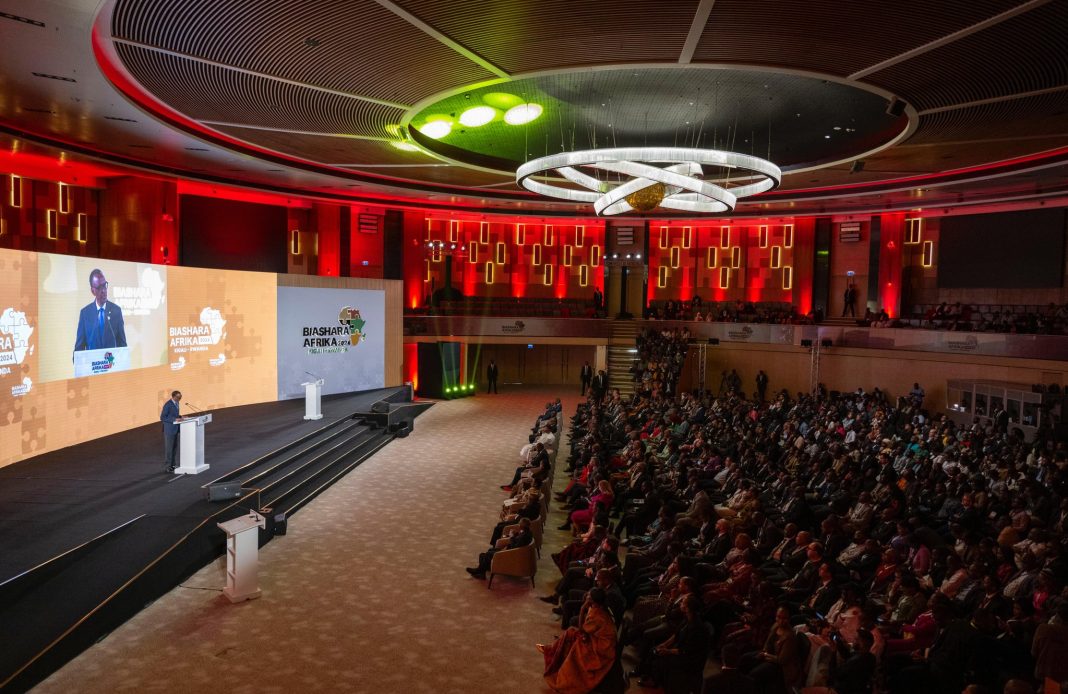The second edition of the African Continental Free Trade Area (AfCFTA) business forum, known as Biashara Afrika, is currently underway in Kigali, Rwanda, bringing together thousands of delegates from across Africa and beyond. The forum, which commenced earlier this week, is set to conclude on October 11, having fostered key deliberations aimed at advancing intra-African trade and addressing barriers to the success of the AfCFTA agreement.
Attended by political leaders, business representatives, and policymakers, the forum has become a hub for sharing insights and discussing strategies to unlock Africa’s trade potential.
Challenges Facing Cross-Border Trade
Neo Sekhesa, representing the women-owned distillery House of Linford from Lesotho, expressed concerns about the numerous challenges businesses face in cross-border trade, particularly tariffs and other regulatory hurdles.
“International tariffs hinder us as small entrepreneurs. Different governments need to understand our challenges. While there will be differences between countries, we are all striving to grow Africa economically,” Sekhesa said.
She highlighted how the time-consuming process of securing export licenses, combined with difficulties in finding agents in other countries, often delays market entry and results in significant financial losses.
Despite these challenges, Sekhesa remained optimistic about the opportunities the AfCFTA platform presents, noting that she had already connected with potential partners from Rwanda and Kenya.
Payment Systems and Bureaucratic Hurdles
In addition to tariffs, delegates emphasized that inadequate cross-border payment systems are also slowing down trade. Naim Gulam, from Malawi, who is exhibiting agro-commodities at the event, cited payment delays as a major issue.
“For instance, when we want to send products to Zimbabwe, they lack the foreign exchange to pay, even though there is demand for our products,” Gulam explained, advocating for the prompt establishment of a continent-wide payment system to resolve these issues.
He also called for the simplification of cross-border documentation to alleviate the bureaucratic obstacles faced by exporters.

Movement of Goods and People within Africa
Didintle Moreki, a cosmetic product manufacturer from Botswana, raised the issue of visa requirements across African countries, describing it as a significant barrier to trade.
“The issue remains that we still require visas within Africa. It is time for African countries to allow free trade among ourselves, as this is essential for fostering trade,” Moreki urged, echoing the sentiments of many participants.
Political Will and the Need for Ratification
Ugandan tech entrepreneur Gilbert Junior Buregyeya stressed the importance of political will in ensuring the ratification of the AfCFTA agreement. Although several countries have signed the deal, many have yet to ratify it, hindering businesses looking to expand.
“Government officials need to discuss the challenges preventing ratification and implementation. Moreover, there is a need to raise awareness among the public about the importance of AfCFTA,” Buregyeya said.
A Call for Action
Across the forum, the call to move beyond discussion toward tangible action was echoed. Nigerian entrepreneur Weyinmi Eribo voiced her desire for real progress, hoping that this forum would mark a shift from debate to decisive steps towards AfCFTA implementation.
“We want to witness a transition from dialogue to action, and I am genuinely hopeful that significant developments will arise from this,” Eribo remarked.
Leveraging African Expertise
Cameroonian business leader Beven Nebafor Awusa emphasized the importance of tapping into African expertise, arguing that solutions should come from within the continent, rather than seeking external help.
“We should recognize that we are all Africans with solutions to offer. We need not look abroad for expertise,” Awusa concluded.
As the forum progresses, participants remain optimistic that AfCFTA will usher in a new era of intra-African trade. However, the path ahead requires addressing the pressing challenges identified, particularly around tariffs, payment systems, and political will, to fully unlock the potential of the African market.


